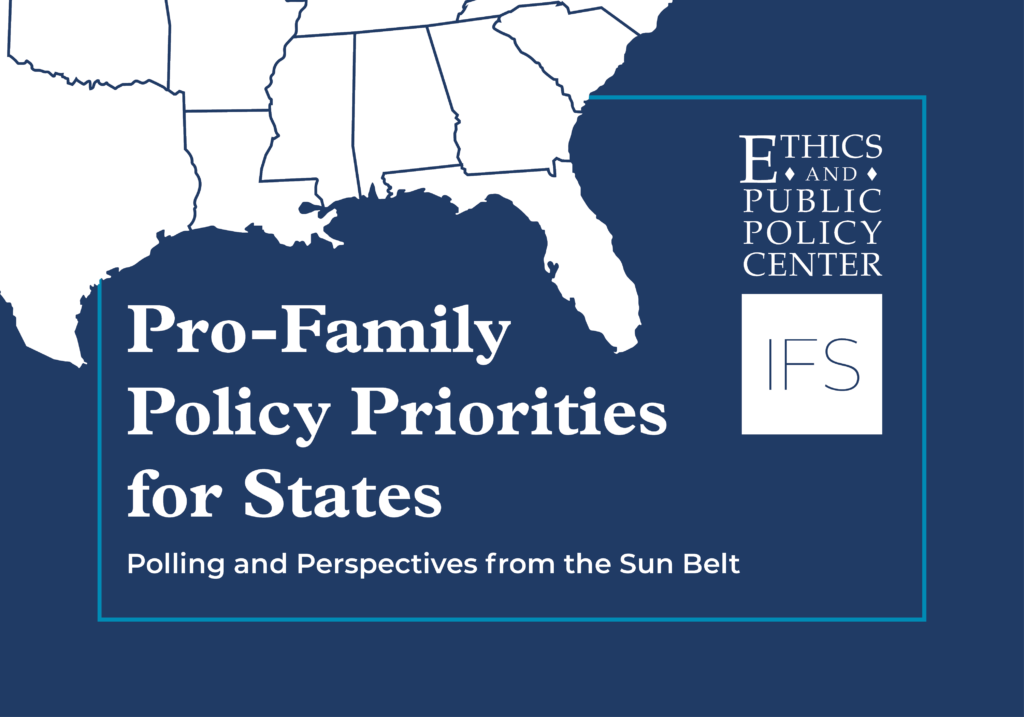
Published December 14, 2023
Polling and Perspectives from the Sun Belt
Introduction
America’s system of federalism means that the issues that most directly impact the lives of parents and families are often most appropriately dealt with at the state level. While many conversations about how to make family life more affordable and achievable in the U.S. tend to focus on the federal tax code, state policy interacts with how families live their daily lives—at school, at the workplace, and at home.
Decisions over land use, school funding, workforce training, and health care coverage vary widely from state to state. And many states are exploring how to orient their policy status quo in a more pro-family direction.
At a time when many states are struggling to maintain positive population growth, the five states we highlight in this report—Florida, Georgia, North Carolina, Tennessee, and Texas—have seen population growth rates in double digits since 2010. Only nine states in the nation have more children under five today than they did a decade ago—and Texas, Florida, and Tennessee are among their number.
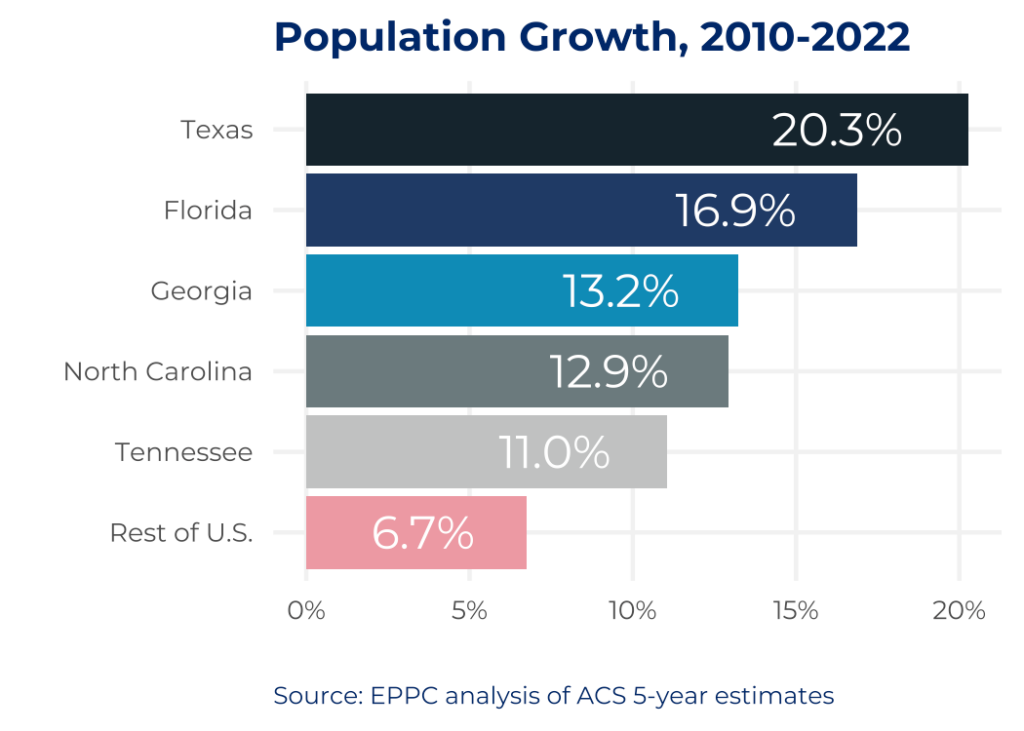
Our five selected states share some key similarities—they are benefiting from the U.S. population’s re-balancing towards the Sun Belt, they boast business-friendly economic climates, and they are, on the whole, politically conservative, though not uniformly so.
Families are voting with their feet towards the Southeast, and governors in these states have already placed a rhetorical down payment on helping their respective states be more friendly to families:
- “Florida must always be a great place to raise a family—we will enact more family-friendly policies to make it easier to raise children.” —Gov. Ron DeSantis, Jan. 2, 2023
- “We’re not resting on our laurels . . . Georgia continues to be the best state to live, work, and raise a family.” —Gov. Brian Kemp, May 5, 2023
- “As long as I am Governor, we will ensure Texas remains . . . the best state to live, build a business, and raise a family.” —Gov. Greg Abbott, March 9, 2023
- “Our state continues to be the best place for people to live, learn, work and raise a family. I’ve never been more excited about North Carolina’s future.” —Gov. Roy Cooper, Dec. 28, 2022
- “Tennessee is leading the nation as the best state to work, live & raise a family . . . I am confident that our state’s best days are ahead.” —Gov. Bill Lee, Dec. 29, 2022
And many states have proposed various policies to make it easier on parents. But what does it mean to be the best state in which to raise a family? How should policymakers weigh the different policy proposals that are being discussed? And what are parents looking for from politicians eager to have their state contend for that title?
This report, published jointly by the Institute for Family Studies and the Ethics and Public Policy Center, incorporates exclusive findings from a new YouGov poll of parents in these five key states. We find that parents in Sun Belt states are looking for a slate of family-friendly policies that can make their lives easier without radically burdening the state’s fiscal capacities.
As this report will discuss in greater detail, authentically pro-family policy must treat the family as the most essential unit of a healthy and flourishing society. At their best, pro-family policies will expand choices for parents, allowing them to raise their children and order their lives in the way that best fits their values and preferences. Policies that ignore the importance of strong families, engaged parents, and give preference to the state or the market over the institution of the family, will fall short of their goal. But with this definition in mind, it is also important to understand how the public sees pro-family policies, and that is what this report helps to answer.
The second half of this paper will show that there are some meaningful differences of opinion between parents who describe themselves as either Democrats, Republicans, or neither. But on the whole, there is a surprising level of agreement on many of the policies being polled, if a difference of degree in the level of support and how to prioritize them.
Importantly, it suggests that even Republican parents are looking for a pro-family agenda that meaningfully addresses families’ economic and cultural concerns that make it challenging raising a family today.
This report is to be accompanied by a series of five state-specific supplements offering practical advice for policymakers. While some principles are broadly applicable, the policy landscape and context in each of the five states we polled are different and require a tailored approach. Released in conjunction with and subsequent to this report, these supplements will offer priorities, grounded in public opinion, for decision-makers in each state.
Methodology
To field this poll, YouGov interviewed 1,800 respondents in five states—Florida, Georgia, North Carolina, Tennessee, and Texas—including an oversample of parents with children under 18 in those states. Respondents from each sample were matched to a sampling frame on gender, age, race, and education to produce the final dataset of 1,600 observations, of which 868 were parents with children under 18 at home.
Acknowledgements
Thanks to Dean Ball and Wendy Wang for offering comments on a prior draft of this report, to Michael Toscano for making substantive and helpful contributions during the editing process, and to Lyman Stone for input into the survey design; any errors are the authors’ own. Special thanks to Emily Jones and Sam Silvestro for their help in designing and researching this policy brief.
Key Findings
Since the turn of the century, the Sun Belt has been a reliably conservative region. Each of our five states have Republican control of the state legislatures and have traditionally voted in Republican elected officials to state-wide office (North Carolina is the most politically competitive of the five, with an incumbent Democratic governor.) They tend to boast relatively low personal tax rates and business-friendly economic environments—our spotlighted states take up five up of the top seven slots on Forbes magazine’s most recent “Best States for Business” ranking. By comparison, many of the states that have been most aggressive about spending on programs billed as being pro-family, such as paid leave, have been politically blue states with higher tax rates and greater fiscal capacity.
But a state’s political stance does not remain static, both across time and as population churn changes the composition of voters. As the economic and cultural pressures on parents evolve over the years, and as in-migration alters the political makeup of growing states, the only way to know what sort of pro-family policies do and do not resonate with parents is by putting a finger to the pulse of public opinion.
Because while Sun Belt states are growing, they are not immune to the cultural and economic pressures on families. Some of the pressures are themselves the result of these states’ success in attracting in-migrants, such as a rising cost of housing and longer commute times. Indeed, we find that many parents in Sun Belt states express principles for policymakers that at first blush may seem counterintuitive, but actually reflect a discontent with a “business as usual” approach to family policy.
We found no evidence to suggest parents, even Republican ones, in these five Sun Belt states were opposed to meaningful pro-family measures, and in many cases strongly supported programs and initiatives aimed at making it easier to raise a family. Rather than simply looking for government to “get out of the way,” or offering strong philosophical objections to initiatives like a state-level Child Tax Credit, parents in the states we polled were broadly supportive of pro-family policies.
Across the breadth of policy proposals we polled, we found support—at times overwhelmingly so—for proactive steps to address both economic and cultural challenges.
This is not to suggest a pro-family agenda would look the same in Texas or Georgia as it would in Massachusetts or California. The survey results show a nuanced picture of parents’ preferences, tending to seek action that relies on tax credits and in-kind benefits over large-scale government intervention. There are real differences between racial groups, moms and dads, and single and married parents. Yet there are also commonalities, particularly regarding kids and social media use, as well as online pornography, both of which received widespread support.
Results
Our survey was broken up into two main sections. The first asked respondents if they supported or opposed a variety of measures that are described as pro-family, devoid of any other context, allowing for an unadulterated glimpse into how different policies are understood in general. In the second, we asked about a set of policy scenarios, laying out different priorities and trade-offs, and asking voters to choose which best represented their beliefs. We believe that designing these questions in such a manner offers a unique, more nuanced glimpse into how voters would respond if these ideas were to be introduced into a state’s political context.
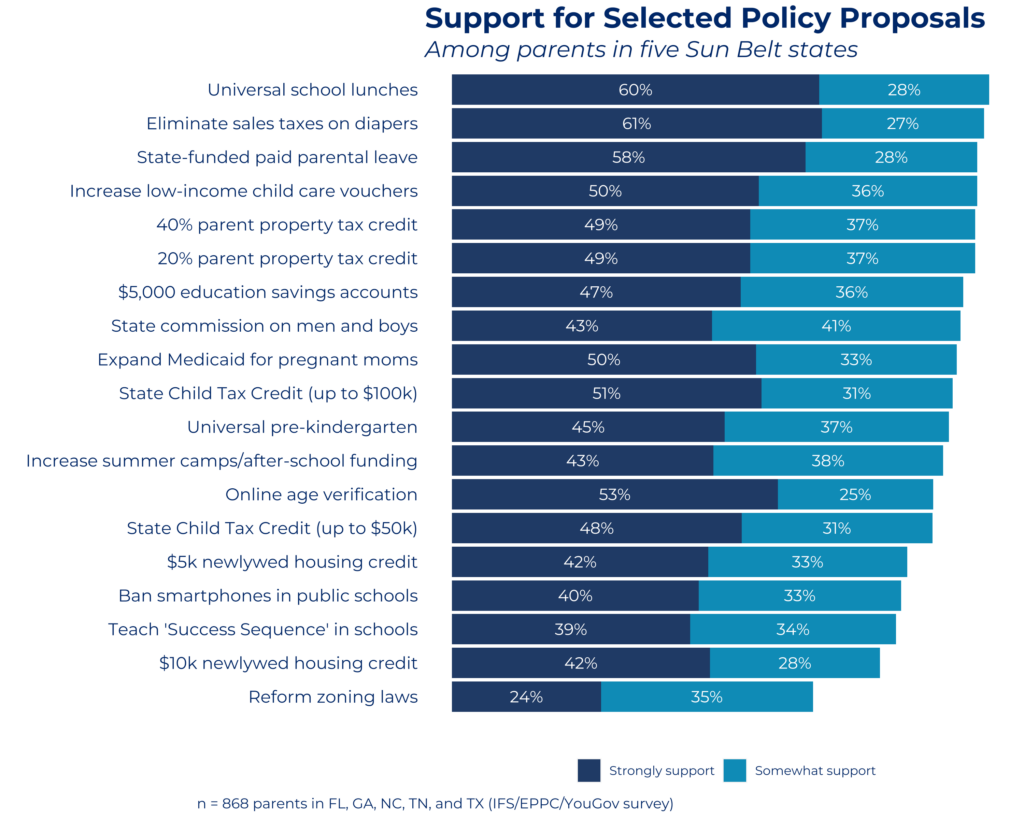
Of course, popularity alone is not the ultimate barometer of whether a given policy is worth pursuing. Politicians should always weigh the state’s fiscal capacity, existing commitments, and overall climate in deciding what to prioritize in their state. Above all, states should pursue policies that strengthen the institution of the family—not seeking to supplant or outsource its responsibilities, and not leaving them to face, with no external support, the cultural and economic forces that make it harder to have and raise kids.
These polling findings and policy implications may not be the right prescription for each state across the United States. But the commonalities across the five states we polled suggest that in dynamic, growing states, families are looking for meaningful action to make it easier to raise their children in the manner they deem best.
Section I: Support for Proposals
The following chart shows the simple share of parents who say they somewhat or strongly support a given policy proposal, with no additional context or counterarguments. To be clear: we intentionally sought to cast as wide a net as possible in selecting proposals to include. Including a given policy is not meant as an endorsement of that idea, but rather as a way of assessing the lay of the land when parents are asked about given ideas that have been billed as “pro-family.”
The first point of emphasis is the most obvious—all 16 policy proposals we polled were either “strongly” or “somewhat” supported by a majority of parents with children under 18. Nearly all options received super-majority support (three of the options were randomized into two different dollar amounts, resulting in a total of 19 options listed above). Even the weakest performer relative to the other options—reforming zoning laws to allow for more housing to be built—was still supported by roughly 6 in 10 parents across our five Sun Belt states, though only “strongly” supported by about one-quarter.
Our topline findings suggest another point of emphasis—that parents across the board are open to policymakers’ ideas for material support that would make family life easier. The five policies that ranked highest among parents would all require some amount of public funds, either in direct expenditures or in forgone tax revenue. There is some discrepancy between demographic groups when it comes to policies to change culture in a more pro-family direction, but again, these are mostly differences in degree. They remain popular with 2 in 3 parents, regardless of party identification.
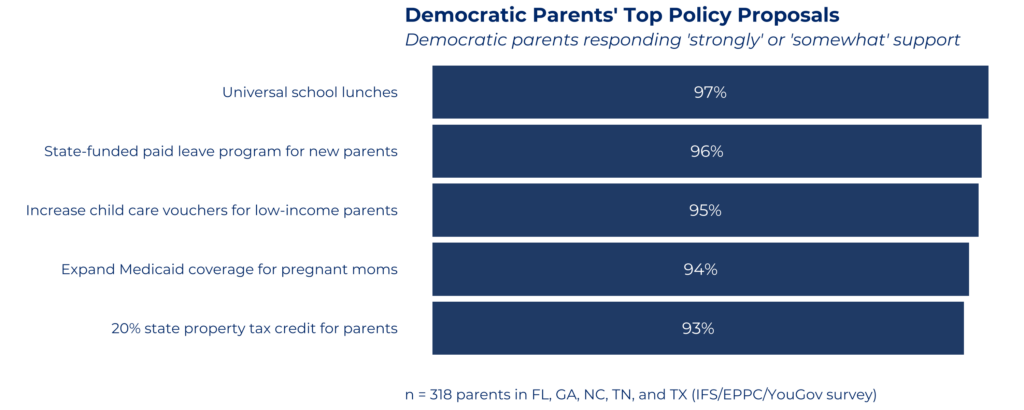
But looking at the five policies with the highest levels of support by party suggests parents’ top concerns largely reflect concerns traditionally associated with their political coalitions. Democratic parents in our Sun Belt states were nearly unanimous in their support for universal school lunches, and also strongly supported proposals to expand safety net spending like Medicaid and child care vouchers.
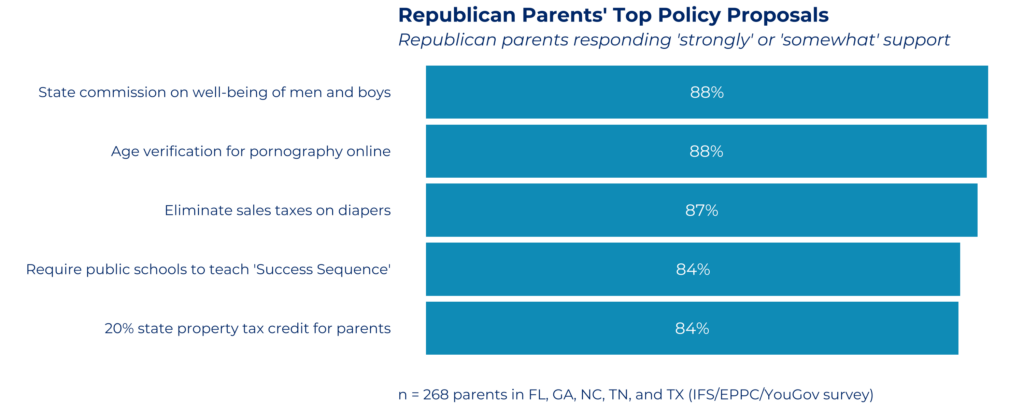
Their Republican peers, on the other hand, gave highest marks to proposals that took aim at the cultural problems they see at the root of family formation. They gave high marks to a state commission on the status of men and boys, requiring internet users to verify their age before viewing online pornography, and encouraging public schools to teach students the “Success Sequence,” defined in our survey as “the idea that young people who graduate from high school, work full-time, and marry before having children are more likely to avoid poverty and be financially successful later in life.”
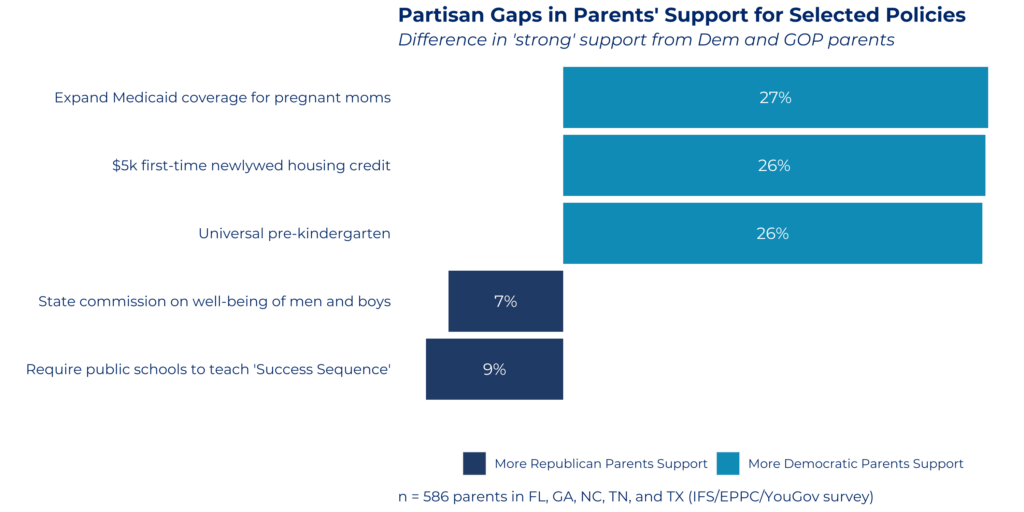
There were other partisan differences, too. The biggest gaps between Republican and Democratic-leaning parents were on the question of a state level child tax credit (CTC). Parents who identified as Democrat were 25 percentage points more likely to support a state child tax credit for families with incomes up to $50,000. But the gap closed when a hypothetical state CTC would go to families making up to $100,000. In fact, Republican parents were 5 percentage points more likely to support a CTC going to families making $100,000 than only those making up to $50,000. Democrats, on the other hand, were slightly more likely to support one focused only on the lowest-earning families. Notably, though Democratic-leaning parents were more likely to support most social spending proposals, they were still supported by a majority of Republican parents.
These partisan preferences strongly correlated with other demographic markers. Racial minority parents were more likely to support each of the options listed. Four out of five Black parents strongly or somewhat supported every policy listed, with the exception of phone-free schools, zoning reform, and the “Success Sequence.” Hispanic parents were especially likely to support provisions related to the cost of education and health care, with less support for phone-free classrooms or tax credits for married couples. White parents were more likely to support property tax cuts for parents or paid leave, and to express the lowest support for zoning reform of any racial group.
While all of the policies in our survey received support from at least a simple majority of parents, some were more polarizing. Reforming local land use and zoning regulations to allow the construction of more housing received the highest level of opposition, with 15% of parents saying they were “strongly opposed” (and 59% saying they were somewhat or strongly in favor, the lowest share of any of the policy options.) A $10,000 tax credit for newlyweds was also strongly opposed by 15% of parents, predominantly conservative-leaning ones.
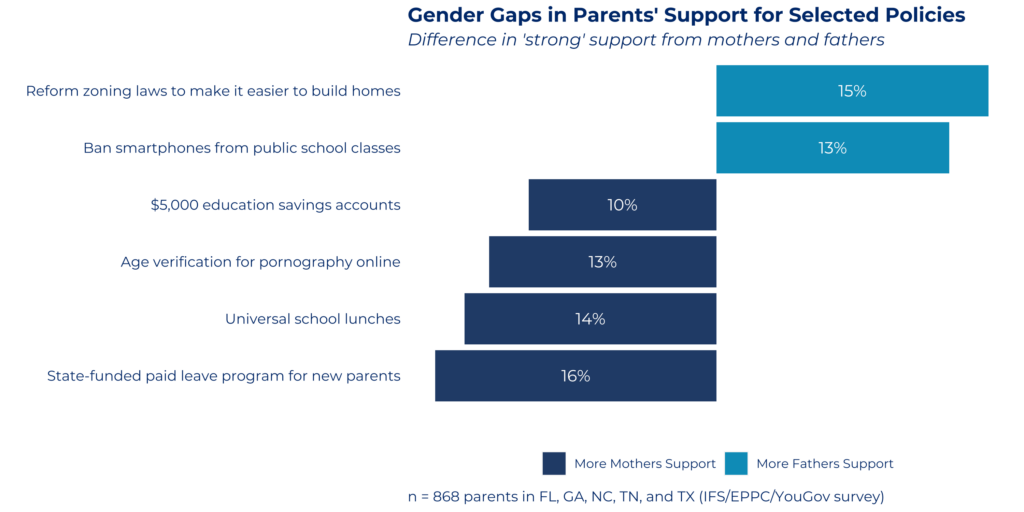
There were a few differences along gender lines in support for pro-family policies. Mothers were markedly more likely to support property tax credits for parents, age verification to view online pornography, and state funding for paid leave and after-school programs. Fathers were more likely to support reforming zoning laws to make it easier to build housing, and to support banning smartphones and teaching the “success sequence” in public schools.
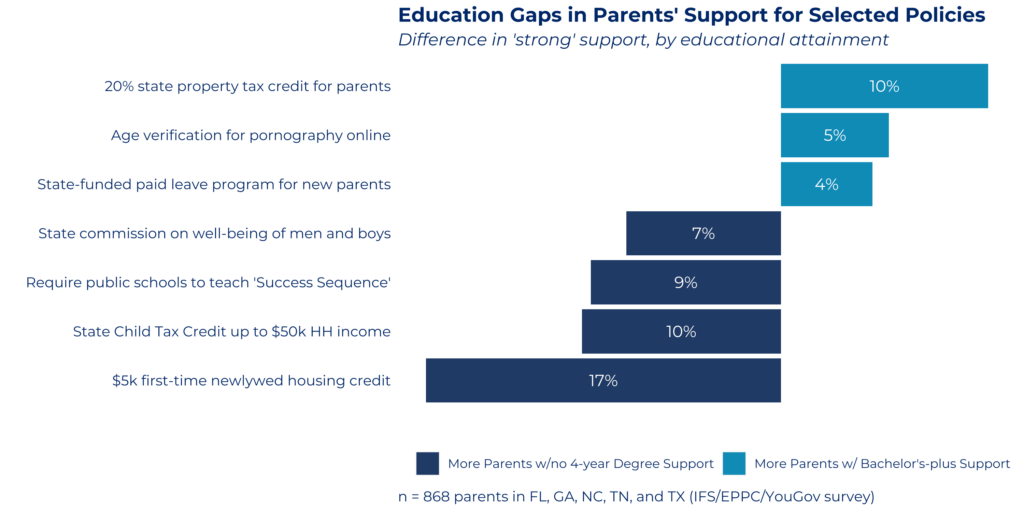
In general, single parents (predominantly mothers) were more likely to support pro-family spending programs, while the differences on cultural issues like the “success sequence,” age verification, and a state commission on men and boys were minimal. Notably, single parents were much more likely to support the idea of a $5,000 newlywed tax credit (85% somewhat or strongly) than married parents (68%). They were also more likely to support property tax relief for households with children, a state-level CTC, and universal education savings accounts.
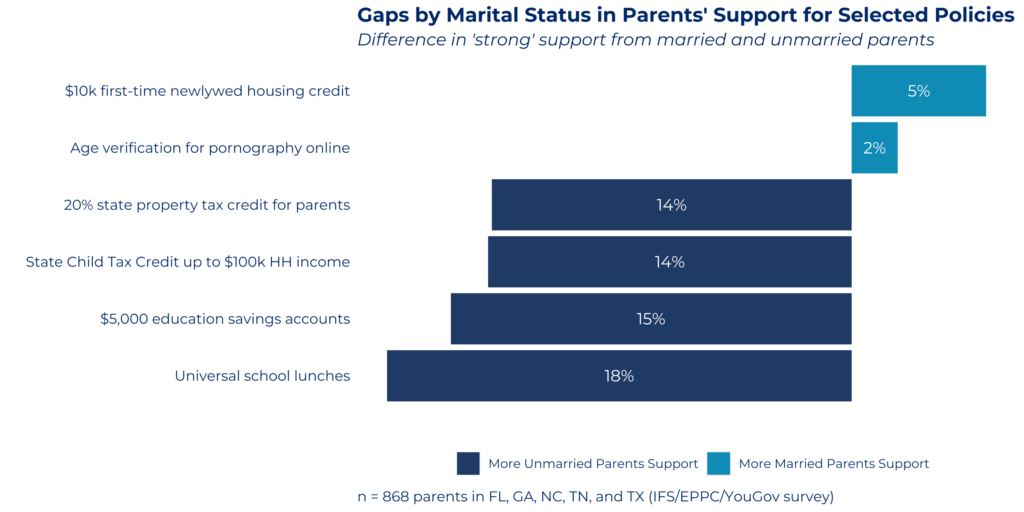
Section II: Choices Between Alternatives
Of course, policy proposals aren’t considered in a vacuum. In the poetry of campaign promises as well as in the prose of actual governance, politicians must make choices about which approaches to prioritize and where to devote limited resources. Asking about parents’ general level of support for a given set of policies in the abstract is interesting and informative. But putting these questions in the context of real-life debates offers an even more informative lens into what they are looking for from policymakers.
Our poll presented parents with a set of 10 different scenarios and asked them to choose which response best matched their viewpoints.
Economic Concerns
One of the biggest recent federal battles in pro-family spending has been over the Child Tax Credit, and the Biden administration’s pandemic-era temporary expansion to all parents. We asked about two common parameters of the credit: who should be eligible, and how the credit should be designed.
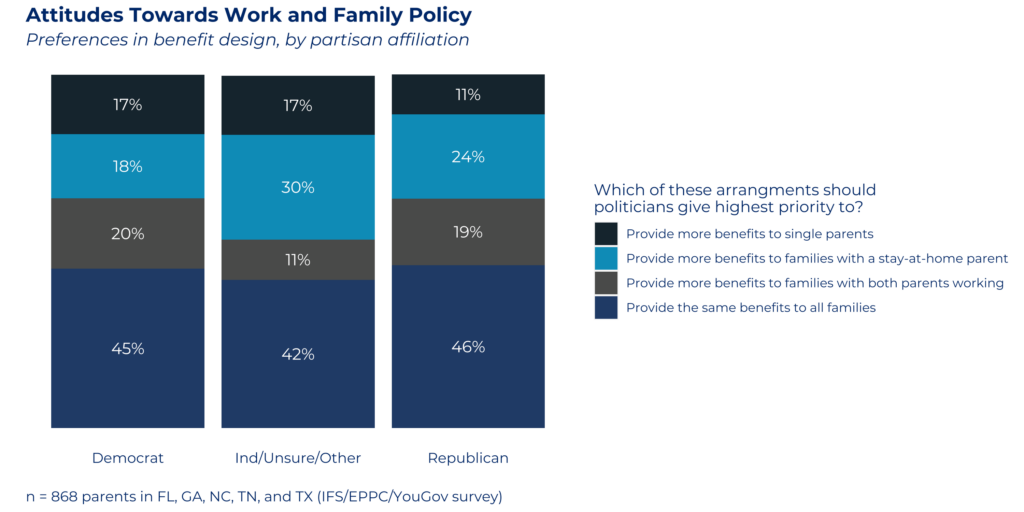
Parents were prompted with the statement that “Some politicians say families with young children benefit from having a parent stay at home, while others say it is important to encourage parents to be working.” In response, just under half of all parents, across both parties, said the CTC should be designed to provide the same benefits, regardless of family structure. Republicans and Independents were more likely to support giving higher CTC benefits to families with a stay-at-home parent.
Similarly, a plurality—though not a majority—of respondents thought all parents, regardless of income or marital status, should be eligible for the CTC. And 28% of parents, predominantly left-leaning, said that only low-income families should receive the CTC, while 22% said only families with at least one parent working should be eligible.
Our report offered a set of popular policy responses to two large expenses often associated with decreasing family formation: housing and child care.
There was an evident and expected partisan divide on how best to approach these specific policy questions. In housing, Democratic parents strongly preferred increasing funding for affordable housing and voucher programs (69%) over reducing regulatory barriers to increase the housing supply (24%). Republican parents, by contrast, placed regulatory reform (43%) ahead of affordable housing funding (32%), and 25% said policymakers should do nothing.
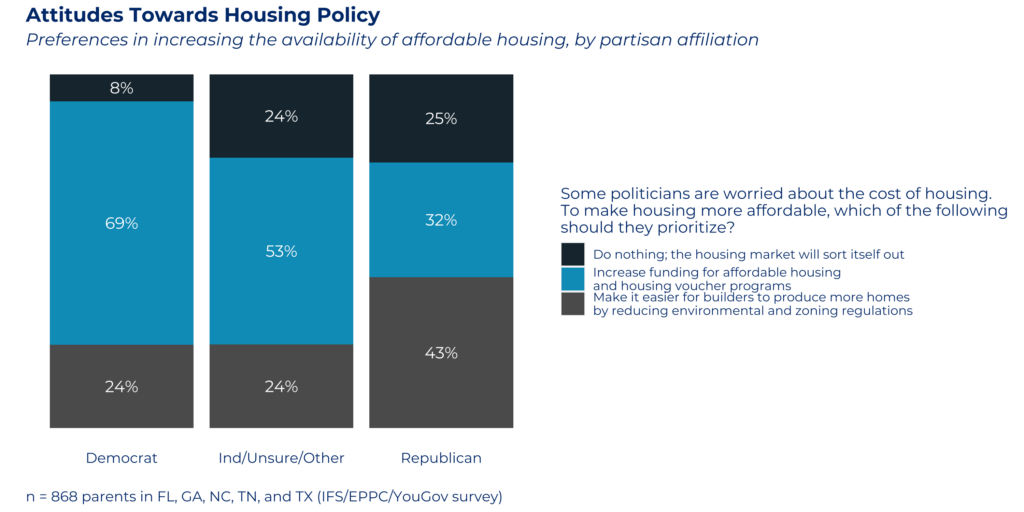
There was less of a partisan divide in how to best deal with child care affordability. None of our three groups were especially eager to raise taxes to pay for a child care approach that would provide direct payments to parents as well as a state child care program. Republican and unaffiliated parents were slightly more comfortable with the idea of doing nothing. About one-third of parents supported giving parents direct cash payments to help make child care more affordable, but the modal response across all three partisan groupings was that politicians seeking that goal should invest in state child care programs.
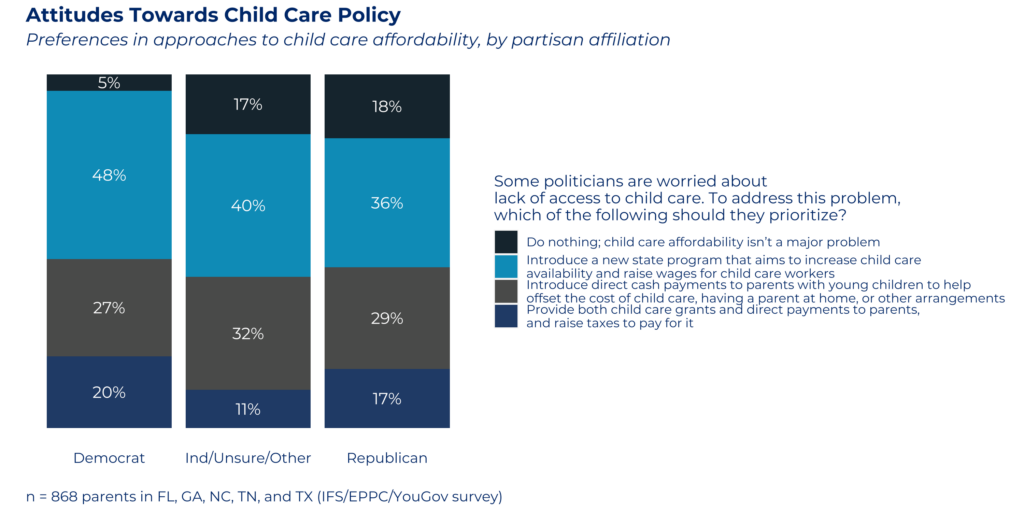
Abortion and the Institution of Marriage
All five of our spotlighted Sun Belt states have taken at least some action in the wake of last year’s Supreme Court decision in Dobbs vs. Jackson Women’s Health Organization. In the conversations that have ensued, different policies have been proposed, and some enacted, to better support mothers and children.
In our poll, there was no consensus behind any individual approach to better supporting pregnant and new mothers, and their babies, in the wake of the Dobbs decision. Republican parents were most likely to support prioritizing plans to make diapers and other infant-related essentials tax free, while Democrats preferred expanding Medicaid coverage, and raising taxes to pay for a wider array of social safety net approaches. Among parents, 22% of Republicans, 18% of independents or the politically unaffiliated, and 5% of Democrats said no further action was needed to support mothers and children in the wake of the Dobbs ruling.
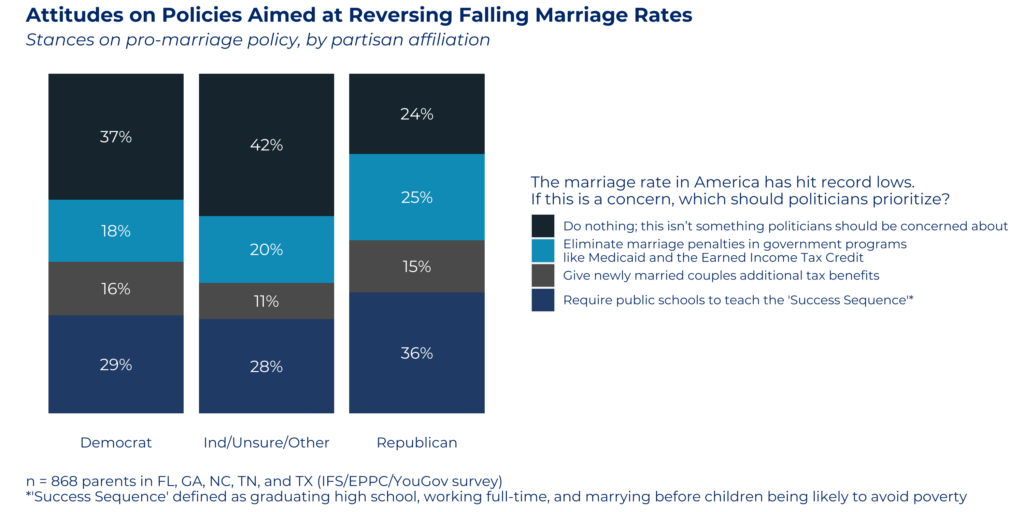
With marriage rates at or near record lows, some politicians have begun talking about encouraging marriage though various safety-net or tax code provisions. 41% of politically unaligned parents didn’t think the decline in marriage was something politicians should concern themselves with; 37% of Democrats and 24% of Republicans said the same.
Among those who did want to see policy action to bolster marriage rates, the most popular response favored the bully pulpit over material incentives; all three political groupings thought politicians should require public schools to inform students about the social and economic benefits of marriage first. Eliminating marriage penalties in the tax code or social programs came next, followed by giving newly married couples additional tax benefits.
Our respondents were asked what government should do about a potential crisis facing men and boys; about one-fifth, across partisan groupings, responded that there was no crisis. The remainder had a strong preference for expanding non-college opportunities into the middle-class, like apprenticeships and vocational education (44% of Republican parents, 34% of Democrats, and 40% of politically unaligned ones said politicians should place that effort first.) To address the potential crisis of masculinity, one-quarter of Democrats thought policymakers should encourage more men to work in health care, education, and social work; one-fifth of Republican parents said public policy should seek to restrict underage males’ ability to access online pornography.
The Definition of “Pro-Family”
Reflecting the political divide, there was a partisan difference of opinion about what a “pro-family” approach to politics should prioritize. Half of parents, including 66% of Democrats and 37% of Republicans, said a political platform that “introduced new social programs aimed at reducing the cost of living” sounded more “pro-family” than one that “emphasized parents’ values” in schools and protecting children online. 45% of Republican parents, and 16% of Democratic and independent-leaning parents, said the inverse. No survey wording is perfect, and asking about “parent’s rights” may have elicited a different breakdown. But they suggest that a “pro-family” agenda that does not address families’ material concerns will not be seen as substantive as one that does.
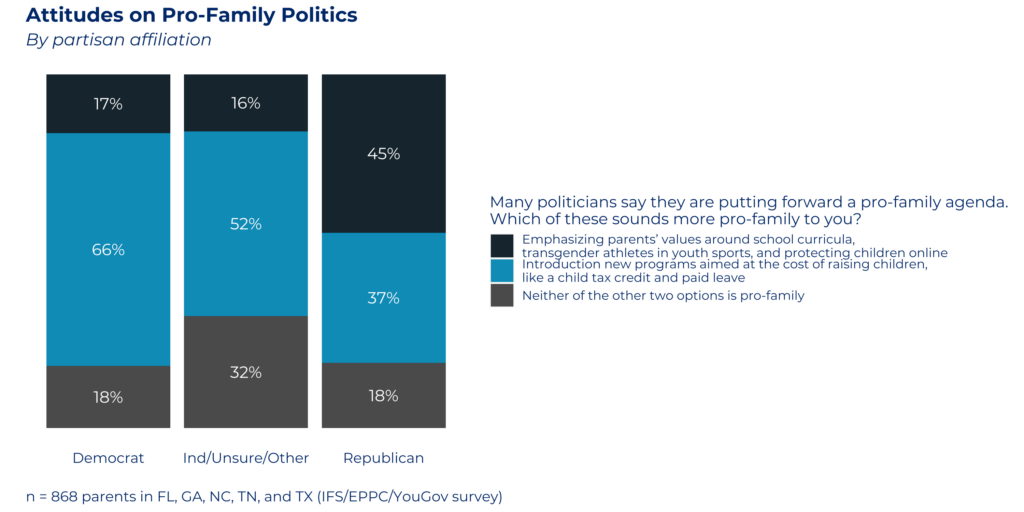
Some of the largest partisan differences can be found in capturing what makes a state appealing to families. Half of Democratic parents said the way a state can best support families is by increasing spending on social benefits like child care vouchers or the CTC. Conversely, 72% of Republican parents listed either cutting income or property taxes for children or improving the state’s business climate to attract high-paying jobs as the best way for a state to support families. Independent parents were split in between; a third prioritized cutting income and property taxes for parents, while another one-third encouraged higher social spending on children.
Discussion
In assessing the findings from our survey of parents in five key Sun Belt states, two major themes became evident:
1) Parents are not simply looking for government to get out of the way; they support proactive steps to make it easier to raise a family
2) Parents, particularly Republican ones, are concerned not just about the economic stresses on families, but the cultural challenges they must navigate
Because our five spotlighted states tend to skew politically conservative, one naïve expectation might be that parents in these states would prefer tax cuts and deregulation as the extent of a pro-family agenda. That was decidedly not the case. A majority of parents who self-identified as Republican were at least nominally supportive of each of the pro-family policies we polled, even those that would require additional spending at the state level to make happen.
Measures that touched on cultural concerns, with no direct fiscal outlay, received exceptionally strong support from Republican parents, including restricting access to online pornography and teaching the “success sequence” in public schools. But it was simply not the case that Republican parents opposed measures often described as pro-family, even those requiring additional state spending. Strong majorities of Republican parents in our Sun Belt states supported increasing state funding for child care vouchers, paid leave, after-school programming, school lunches, a property tax credit for parents, and eliminating the sales tax on diapers.
Of course, their level of support tended to be lower than their Democratic or politically- unaligned peers. But on none of the array of policies we polled did more Republican parents express opposition than support.
As with any public opinion poll, some epistemic humility is in order—asking respondents about specific policies is known to engender what is known as “acquiescence bias,” where those taking a survey instinctually approve of a given idea without fully considering the trade-offs or arguments against it. Questions can be sensitive to wording and framing, and though we did randomize the order in which they were presented, can suffer from priming respondents to think a certain way. And a nominal level of support, of course, does not imply that these respondents would prioritize any of these policies in any given election.
And some topics did engender more passionate opposition: 31% of all Florida respondents, including parents, said they strongly opposed reforming zoning laws to make it easier to increase the housing supply; one-quarter of Tennessee respondents felt the same. While outnumbered by those expressing that they “strongly” or “somewhat” supported land use reforms, this intensity of opposition illustrates why market-driven housing reforms have been politically challenging.
Similarly, a first-time newlywed housing credit, while generally popular, engendered relatively high levels of “strong” opposition relative to other policies, suggesting some reluctance to espouse policies that are seen as directly inducing something as personal as marriage. Buttressing this interpretation, 35% of parents, including one-quarter of GOP parents, said that politicians shouldn’t do anything about declining marriage rates.
At the same time, some of the cultural issues that have fueled conservative politics concerned parents across the political spectrum. In Texas, 92% of all respondents, not just parents, supported a state law requiring internet users to show proof of age to view pornography online. 83% of parents across all five states said they wanted policymakers to take action on making it easier to protect kids online, with 88% of Republican-identified parents and 83% of Democratic ones supporting age verification requirements to view online pornography.
A slight plurality of parents preferred to see policymakers work with tech companies to filter and limit access to certain content; about a third of parents preferred politicians prioritize laws that would require children to obtain their parents’ permission before opening a social media account. But these numbers were stable across partisan breakdowns. For instance, only 13% of Democratic parents, and 12% of Republican ones, agreed with the idea that when it comes to tech, the state should “do nothing; this isn’t a problem government should try to solve,” suggesting a bipartisan hunger for additional action on kids and tech.
Grounding Our Understanding of Pro-Family Policy
Discussions of “pro-family policy” rub some observers the wrong way. On the left, some would prefer to “abolish” the nuclear family; on the right, some believe that active intervention on behalf of families is a distortion of the free market and a precursor to government intervention elsewhere.
But strong families are the cornerstone of a healthy society. From Alexis de Tocqueville onwards, many have observed that the success of the American experiment itself can be said to depend, in no small part, on strong and stable families.
Strong families are correlated with lower crime rates, lower rates of interpersonal violence, increased academic achievement, higher lifetime earnings, and a whole host of positive social indicators. Indeed, recent research tells us that nothing better predicts the health of the American Dream, at the community level, than the share of two-parent families in a community. Likewise, other recent research finds that nothing better explains the declining share of men and women succeeding in that quintessential American pursuit—“the pursuit of happiness”—than the falling marriage rate. As the family goes, so goes the United States.
The aim of family policy, then, should be to strengthen and stabilize American family life. Among the principles a robust pro-family agenda ought to advance include:
- Seek to strengthen the institution of marriage and the enduring relationship between mothers, fathers, and their children that forms the core of family life.
- Ensure that children and their parents receive the care and social support they deserve to ensure a healthy start to life.
- Acknowledge the out-of-pocket and opportunity costs associated with becoming a parent, and advance policies that would make having children more affordable and achievable.
- Develop policies that create flexibility for parents without jeopardizing their financial security, allowing more families to find the work-life balance that is right for them.
- Remediate imbalances in tax and safety net policies, recognizing the family as an economic institution, and ensuring married families are not penalized relative to single or cohabiting parents.
- Respect and promote the fundamental right of parents to raise their children according to their faith, values, and beliefs.
Starting with the family as a core and integral building block that makes up a flourishing society means recognizing that no two families are alike; parents face a variety of trade-offs, different preferences, and changing work and household situations. Parents with a college degree, for example, are much more likely to favor center-based child care compared to those without; but some approaches to child care presume center-based care should be the preferred model for all. Government policies that prescribe a one-size-fits-all approach to questions of work-life balance or the care of young children misunderstand the heterogeneity of parents’ preferences and can ultimately undermine the autonomy of the family.
This means standing up for families against universalist approaches that assume the state should take over the responsibilities that parents bear. But it also means standing up for families against the pressures of a market economy. Pro-family policy does not mean making families more accessible to employers, or assuming the highest goal is increasing labor-force participation. Many parents, especially when their children are young, prefer to work part-time, or to take some time out of the labor force. But many proposed social programs are structured in a way that assumes both parents will be full-time workers or are sold as resulting in greater attachment to the labor force. Policymakers must become comfortable with the idea of creating space for families—particularly those who have just given birth—away from the demands of the market, and recognize that, at times, that will require prioritizing the needs of the family over the needs of the labor market.
Policies that expand the choice set for parents, giving them more options and ability to raise their children in the way they deem best, are authentically pro-family. So, too, are policies that seek to shore up the institution of marriage and increase the share of children raised by two parents. Policies that treat family structure as incidental, or seek to outsource the responsibility of caring and raising children to the institutions of the market or state to the greatest extent possible, do not merit that definition.
Conclusion: A Vision for Proactive Pro-Family Policy
Of course, popularity alone is not the ultimate barometer of whether a given policy is worth pursuing. Politicians should always weigh the state’s fiscal capacity, existing commitments, and overall climate in deciding what to prioritize in their state. Above all, states should pursue policies that strengthen the institution of the family—not seek to supplant or outsource its responsibilities, and not leave families to face, with no external support, the cultural and economic forces that make it harder to have and raise kids.
But what these polling numbers do suggest is a hunger from families for state governments to take a more proactive role in putting policy muscle behind their strong claims on being the “best state in which to raise a family.” Supporting families need not require a blank check or a revolution in social policy; some of the policies parents most strongly support would have little to no direct impact on state budgets.
Policymakers at the state level should take the goal of being the “best state in which to raise a family” seriously. Doing so means listening to parents and finding policy solutions to address the challenges of raising a family, both in affording the cost of living and in raising children in the manner parents deem best.
Appendix: Policy Options
In polling parents in our five key Sun Belt states, we attempted to cast a wide net, including ideas conventionally associated with the political right and left, touching on both pocketbook issues and broader societal challenges. This appendix summarizes the policy options we polled and offers a non-comprehensive snapshot of states that have already taken action.
In this section, we offer a brief explanation of each of these options and examples of states that have pursued or explored these ideas. While not exhaustive, this slate of policy options offers a sense of the various pro-family ideas that have been proposed, and what resonates with parents most strongly.
Universal school lunches: In California, Colorado, Maine, Minnesota, and Vermont, states have given school districts the option of covering school meals to all K-12 student regardless of parental income.
Eliminate sales taxes on diapers: As of July 2023, 24 states do not tax diapers, including Colorado, Iowa, and Maryland, and Florida, which all recently passed laws exempting them from state sales tax. In Florida and Ohio, state policymakers have included other non-essential infant-related items as well.
State-funded paid leave program for new parents: Thirteen states, including Colorado, Maine, Maryland, Minnesota, and Oregon, now offer state paid leave programs for a variety of instances. Thirty-six states, including Georgia, Texas, and North Carolina are among the states that offer paid parental leave for state employees.
Increase child care vouchers for low-income parents: Every state participates in the federal Child Care and Development Block Grant (CCDBG) program, which provides child care assistance to predominantly low-income parents. Implementation of CCDBG varies from state to state.
State property tax credit for parents (polled at both 20% and 40%): Some states rely heavily on property taxes, which burdens families disproportionately (families with children under 18 need more space but have a higher dependent-to-earner ratio). Some politicians have proposed giving parents with children at home a credit against state property taxes.
Education savings accounts (polled at $5,000): Education Savings Accounts give parents a state-supervised fund that can be used for education-related expenses, including private school tuition, homeschooling expenses, textbooks, services for students with disabilities, etc. Currently, eight states—Arkansas, Florida, Indiana, Oklahoma, North Carolina, Tennessee, Utah, and West Virginia—offer universal or near-universal ESAs.
State commission on well-being of men and boys: Concern about the labor market, educational, and relational outcomes of men has led multiple states to consider the creation of a state commission on the well-being of men and boys. It would examine the prospects facing men, particularly those without a college degree, and offer lawmakers proposals aimed at bridging the gender gap in schools, improving career and technical education, expanding apprenticeships, encouraging involved fatherhood, and strengthening the marriageability of young men.
Expand Medicaid coverage for pregnant moms: Currently, federal law requires states to offer Medicaid coverage to mothers in households making up to 138% of the federal poverty line (FPL). Most states opt to expand eligibility beyond that, including Florida (196% of FPL), Tennessee (200% of FPL), and Georgia (225% of FPL).
State Child Tax Credit (polled at household income eligibility up to $50,000 and $100,000): In addition to the federal Child Tax Credit (CTC), 14 states now offer their own state-level CTC, including Colorado, Connecticut, Maine, Massachusetts, and Oklahoma. The state CTCs are usually offered only to households up to a certain income threshold; some are fully refundable, while others are only refundable up to an individuals’ tax liability.
Universal pre-kindergarten: Seventeen states currently offer some version of universal pre-kindergarten, in which age is the sole criteria of being able to attend a publicly funded pre-school program. They include Florida, Georgia, Oklahoma, and West Virginia.
Increased funding for summer camps or after-school programs: Multiple states and localities have earmarked funds for programs such as summer youth employment, and summer and after-school recreational camps, as well as eliminated pay-to-play policies in school extracurricular activities.
Age verification for pornography online: Seven states, including Arkansas, Mississippi, Virginia, North Carolina, Utah, and Texas, have passed legislation requiring internet users to provide proof they are of age before accessing sexually explicit online content. These laws have been met with both success and failure in various court challenges; other states are contemplating passage as well.
Newlywed housing credit (polled at $5,000 and $10,000): There have been some proposals to create a one-time tax credit that couples who have been married within the past year could apply towards a down payment when purchasing a new house. None have been passed by a state legislature to date.
Ban on smartphones in public school classes: According to federal data, 77% public schools nationwide ban the use of phones during class time. Arizona, Florida, Maine, Maryland, and Utah have all passed some version of a ban on phone usage during class periods.
Require public schools to teach ‘Success Sequence’: Some politicians have proposed including aspects of the “Success Sequence”—the concept that young adults who graduate from high school, work full-time, and delay child-bearing until after marriage have a much lower risk of living in poverty—in high school education curriculum. No state legislature has passed this proposal to date.
Reform zoning laws to make it easier to build homes: Though most zoning rules are set at the local level, some states have passed legislation encouraging cities to reform their land use regulations to make it easier to increase the housing supply to varying degrees, including Montana, Washington, Vermont, and Florida.
Patrick T. Brown is a fellow at the Ethics and Public Policy Center, where his work with the Life and Family Initiative focuses on developing a robust pro-family economic agenda and supporting families as the cornerstone of a healthy and flourishing society.












